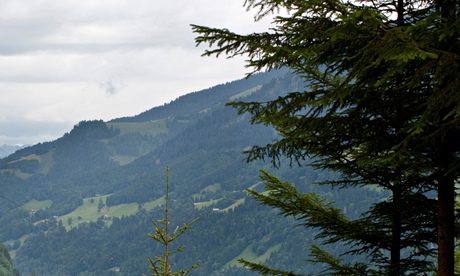
John Cowper Powys described Matthew Arnold in The Pleasures of Literature as "the great amateur of English poetry" who "always has the air of an ironic and urbane scholar chatting freely, perhaps a little indiscreetly, with his not very respectful pupils."
This is unfair, possibly, to the philosophically searching author of the dramatic poem, Empedocles on Etna, and it ignores what might be Arnold's outstanding appeal for contemporary readers, his skill at evoking place. This week's poem, A Dream, shows a vibrant, sensuous landscape-painter at work while, ostensibly, "chatting freely, perhaps a little indiscreetly."
There's little hint of the academy, no implicit pupils, in this conversation poem. Line 22 reveals, in fact, a woman addressee, "Marguerite! and thine" – a muse figure who appears elsewhere in Arnold's work, but who may also be a real woman he knew in Thun, Switzerland, where the poem's set. There are two other named people, Martin and Olivia, whose identities are similarly uncertain. No matter: the names further the narrative's immediacy and informality.
Anold's editor, Kenneth Allott, dates the poem's composition between 1849-53. He proposes that the descriptive vividness implies an actual dream. It's also possible that the boat trip is simply a memory which has become dreamlike in retrospect. The opening question, "Was it a dream?" and the undecided answer establish the slightly unreal quality of the experience.
Yet the poem is full of realistic detail, from the "bright-leafed chestnuts" to the "plank cottage" with the "rows of Indian corn" stored under the eaves. There are startling colour contrasts ("green Alpine stream", "frail scarlet-berried ash", ie mountain ash, "warm golden gourds") and stunning effects of light and shadow: the "glittering chalets", "diamond-bright" wall of snow, and all the chiaroscouro of mixed foliage. But of course the poet's concern is with more than travelogue. This is revealed early on: the conifers give him the terms "umbrage" and "pinings" – rich nouns performing literal and metaphorical functions. This is a poem concerned with the passage of time as well as changing landscape.
The boat seems to descend rapidly, thanks to subtle rhythmic shifts under cover of the evenly-paced blank verse, and yet the "sights" emerge slowly enough to etch their details on the mind. The girls on the balcony appear at first a little staged, with their costume-drama straw hats and fluttering ribbons. Then, as Arnold fills in the interactions, their excitement becomes palpable: "They saw us, they conferr'd; their bosoms heaved … " In raising their "white arms" which "flashed once, they become retreating mythical figures, perhaps hinting at Arthurian legend. These arms, also "streams", are the final luminous image, as now the poem and the boat plunge from "the rapid's top", faster and farther away from the vision and the dream.
Keats, especially the Keats of the Ode to Autumn, is a clear presence – in the "mossed walnut trees" and the foliage-bedecked cottage, for instance. The "wild pastoral music" echoes the unheard melodies of the Ode On a Grecian Urn. But the impulse to prioritise realism over myth is Arnold's own, as is the timbre.
A whole verbal orchestra plays in A Dream. Its long syntactic melodies incorporate carefully-timed pauses (note the abundant commas, the clever uses of the dash). From mossed trunks to city-bristled plains, wet glossy greenness to harsh driness, woodwind to brass, the voyage through the different topologies is symphonic as well as pictorial and always an affair of the senses.
The river has only one destination. But Arnold rejects any temptation to a self-indulgent "dying fall". Stiffening the syntax by a Latinate inversion, he plays his classical scholar's card with brilliant effect. The concluding verb "received" puts a characteristic seal of stoic, and also Christian, acceptance on the dissolution of quick-moving youth into sedentary maturity, river into sea.
A Dream
Was it a dream? We sailed, I thought we sailed,
Martin and I, down a green Alpine stream,
Bordered, each bank, with pines; the morning sun,
On the wet umbrage of their glossy tops,
On the red pinings of their forest-floor,
Drew a warm scent abroad; behind the pines
The mountain-skirts, with all their sylvan change
Of bright-leaf'd chestnuts and mossed walnut-trees
And the frail scarlet-berried ash, began.
Swiss chalets glittered on the dewy slopes,
And from some swarded shelf, high up, there came
Notes of wild pastoral music – over all
Ranged, diamond-bright, the eternal wall of snow.
Upon the mossy rocks at the stream's edge,
Back'd by the pines, a plank-built cottage stood,
Bright in the sun; the climbing gourd-plant's leaves
Muffled its walls, and on the stone-strewn roof
Lay the warm golden gourds; golden, within,
Under the eaves, peered rows of Indian corn.
We shot beneath the cottage with the stream.
On the brown, rude-carved balcony, two forms
Came forth – Olivia's, Marguerite! and thine.
Clad were they both in white, flowers in their breast;
Straw hats bedecked their heads, with ribbons blue,
Which danced, and on their shoulders, fluttering, play'd.
They saw us, they conferred; their bosoms heaved,
And more than mortal impulse filled their eyes.
Their lips moved; their white arms, waved eagerly,
Flashed once, like falling streams; we rose, we gazed.
One moment, on the rapid's top, our boat
Hung poised – and then the darting river of Life
(Such now, methought, it was), the river of Life,
Loud thundering, bore us by; swift, swift it foam'd,
Black under cliffs it raced, round headlands shone.
Soon the planked cottage by the sun-warmed pines
Faded – the moss – the rocks; us burning plains,
Bristled with cities, us the sea received.

